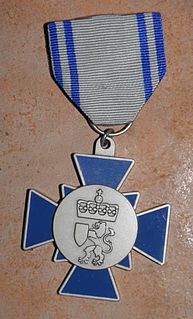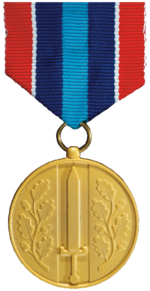
The Legion of Merit (LOM) is a military award of the United States Armed Forces that is given for exceptionally meritorious conduct in the performance of outstanding services and achievements. The decoration is issued to members of the eight uniformed services of the United States as well as to military and political figures of foreign governments.
The Australian honours system consists of a number of orders, decorations, and medals through which the country's sovereign awards its citizens for actions or deeds that benefit the nation. Established in 1975 with the creation of the Order of Australia, the system's scope has grown since then and over time has replaced the Imperial/British honours system that previously applied to Australians. The system includes an array of awards, both civil and military, for gallantry, bravery, distinguished service, meritorious service, and long service. Various campaign and commemorative medals have also been struck. New honours can be awarded at any time, but conventionally most new honours are awarded on Australia Day and on the Queen's Birthday every year, when lists of new honours are published.

The George Medal (GM), instituted on 24 September 1940 by King George VI, is a decoration of the United Kingdom and Commonwealth, awarded for gallantry "not in the face of the enemy" where the services were not so outstanding as to merit the George Cross.

The Defense Meritorious Service Medal (DMSM) is an award bestowed upon members of the United States military by the United States Department of Defense. In the order of precedence of the United States Armed Forces, it is worn between the Purple Heart and the Meritorious Service Medal. The medal is awarded in the name of the Secretary of Defense to members of the Armed Forces who, while serving in a joint activity, distinguish themselves by non-combat outstanding achievement or meritorious service, but not of a degree to warrant award of the Defense Superior Service Medal.
A member of the armed forces mentioned in dispatches is one whose name appears in an official report written by a superior officer and sent to the high command, in which his or her gallant or meritorious action in the face of the enemy is described.
The NATO Medal is an international military decoration which is awarded to various militaries of the world under the authority of the North Atlantic Treaty Organization (NATO). It is manufactured by Eekelers-Centini Intl, of Hemiksem, Belgium.

The Gulf War Medal was a campaign medal approved in 1992, for issue to officers and men of British forces who served in Kuwait and Saudi Arabia during Operation Granby in 1990–91.

The War Cross with Sword is the highest ranking Norwegian gallantry decoration. It is awarded for extraordinary brave actions or extraordinary leadership during combat. A recipient deemed worthy of additional citations will receive up to an additional two swords on the medal ribbon in addition to the "standard" single sword. Additional citations are rare: Gunnar Sønsteby is the only person to have received the War Cross with three swords.

The Iraq Medal was authorised on 23 February 2004. It was a campaign medal issued to members of the British Armed Forces and certain attached personnel, who served between 20 January 2003 and 22 May 2011 on, or in support of, Operation Telic - the designation for British operations during the 2003 Invasion of Iraq and its aftermath.

The South Atlantic Medal is a British campaign medal awarded to British military personnel and civilians for service in the Falklands War of 1982 between the United Kingdom and Argentina. Over 33,000 medals have been awarded. The South Atlantic Medal Association was formed in 1997 for recipients of the South Atlantic Medal.

The Department of the Air Force Decoration for Exceptional Civilian Service is the highest award granted by the Secretary of the Air Force to civilian employees of the U.S. Department of the Air Force. It consists of a medal, lapel button, and citation certificate. With the exception of nominations for bravery, nominees must have established a demonstrable pattern of excellence and achievement which normally have been recognized by previous awards up to and including the Meritorious Civilian Service Award.

The Order "For Military Merit" is a military decoration of the Russian Federation established by presidential decree № 442 of March 2, 1994 to reward military excellence. Its statute was amended three times, first on January 6, 1999 by decree № 19, then on September 7, 2010 by decree № 1099 which modernised the entire Russian awards system and finally on December 16, 2011 by Presidential Decree № 1631.

The Australian Operational Service Medal is a campaign medal established on 22 May 2012 to recognise service by Australian Defence Force (ADF) personnel on designated hazardous operations. It may also be awarded to civilians who serve alongside the ADF on designated operations under specific conditions.

The Valour Cross is the highest military decoration of Denmark. Established on 14 November 2011, and first awarded on 18 November 2011, it is awarded for outstanding acts of courage in combat.

The Western European Union Mission Service Medal, is an international military decoration awarded to individuals, who served with Western European Union (WEU) military missions.
The New Zealand Defence Meritorious Service Medal is a military award of the New Zealand Defence Force (NZDF). Established by Royal Warrant 15 October 2013, the medal may be awarded to recognize meritorious exceptional performance, commitment, or innovation. Military and civilian personnel of the NZDF are eligible for this award regardless of rank or time in service. It will supersede the New Zealand Meritorious Service Medal.

The Defence Service Medal with Laurel Branch is a military medal of Norway. Established on 1 May 1982, the medal is awarded for outstanding or noteworthy service to the Norwegian Armed Forces. It may be awarded to Norwegians and foreigners who are civilians or military personnel.

The Medal for Defence Operations Abroad is a military medal of Norway. Established 1 April 2005, the medal currently recognises 30 days of service abroad in a designated operational area with the Norwegian Armed Forces. Participation as part of an international military staff is also creditable, so long as the service is in the area of operations.

The Civil Defence Cross of Honour is a medal which is awarded by the Directorate for Civil Protection and Emergency Planning of Norway to Norwegian civil defence personnel for helping to prevent loss of life or damage to equipment and property by act of ingenuity in perilous conditions. The medal was established 6 November 2003.

The Operational Service Medal Iraq and Syria or Operation Shader Medal is a British armed forces campaign medal, awarded mostly to military personnel who served in the operational area of, or in support of Operation Shader. The medal was first announced by former Defence Secretary, Sir Michael Fallon on 19 September 2017. It was first awarded, to service personnel, on 18 July 2018 in London by Defence Secretary Gavin Williamson. This Operational Service Medal is the first to be awarded to individuals who served outside of the operational area, reflecting the changing nature of warfare.
















